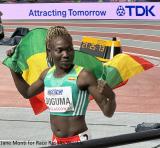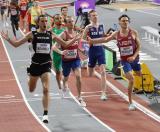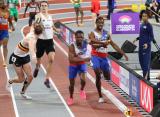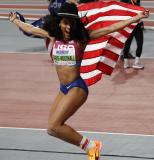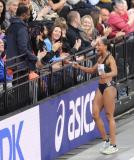Folders |
United States Runs to Four Medals in 1,500 Meters on Final Day of World Athletics Indoor ChampionshipsPublished by
Cole Hocker, Nikki Hiltz Finish With Silvers, Hobbs Kessler, Emily Mackay Take Bronze In Wild 1,500 Finals By David Woods for DyeStat GLASGOW, Scotland – Never had Americans won two 1,500-meter medals at a World Athletics Indoor Championships. In races 15 minutes apart, they did so twice. Although Cole Hocker said for “a split second” he thought he would win a gold medal, he was nonetheless part of a historic night for U.S. milers. “It’s right in your grasp,” he said. “It’s a world silver, regardless of how you slice it.” New Zealand’s Geordie Beamish thought he had sliced it too close – he was sixth with 100 meters left, fifth with 60 left – but produced a sprint carrying him past Hocker and Hobbs Kessler and to the top of the podium Sunday. Beamish spread his arms at the finish, had a look of amazement on his face and put his hands on his head. It really happened. “Couldn’t believe it,” he said. “That was absolutely ridiculous.” Beamish, with a closing 200 of 26.11, had a time of 3:36.54. Hocker closed in 26.53 to finish second in 3:36.69, and Kessler was third in 3:36.72. Two-time defending champion Samuel Tefera of Ethiopia was seventh in 3:38.10. The men’s race preceded the women’s 1,500 meters, in which Ethiopia’s Freweyni Hailu won ahead of Nikki Hiltz and Emily Mackay. Beamish acknowledged that if it were a 3:29 race, as the past three outdoor global finals have been, he could not have employed such a kick. But it wasn’t, and he did. He even changed events last year, moving to the steeplechase, in which he was fifth at the World Championships. Now he is a world champion at 1,500 meters. Beamish, 27, once an NCAA mile champion at Northern Arizona, belongs to the On Athletics Club that includes 3,000-meter silver medalist Yared Nuguse. “I found myself behind Cole early on. I thought he was favorite for the race,” Beamish said. “I felt we had really similar fitness. The two of us have some of the best last 150s in the world. “I felt like if I could keep him within sight, I’d have a good shot.” In the immediate aftermath, Hocker said he wanted more time to reflect. The 22-year old said he might have raced timidly and suggested he should have charged to the front with 500 or 600 meters left. But it was hard to break out. Hocker ran much of the race on the rail, often trapped. Afterward, he had bleeding spike wounds on his legs to underscore that. “I was back there in a boxing match, it felt like,” he said. “I was getting pulled all sorts of directions. That was an experience, that alone. It’s indoor track, and I was ready for that. I am proud of how I stayed calm during that. “I think I can depend on my kick a little bit. I waited until the very end to put the hammer down as much as I could. I beat everyone but one guy who just had that little much more.” He, for one, was not altogether surprised it was Beamish. In a 2-mile Feb. 11 at the 116th Millrose Games in New York, Beamish kicked late and came within .03 of Hocker. “You can never count anyone out,” Hocker said. “Just as I’m coming on, someone else could be running up on me.” The 20-year-old Kessler, a road mile world champion, led almost every step from the start through 1,400 meters. In a 14-man final enlarged by two reinstatements, he wanted to stay ahead of “any possible carnage,” he said. “I was struggling before the race,” he said. “It was a real challenge to stay mentally engaged, but I'm really proud. I made a lot of mistakes, but the more experience I get, the better.” Only other country to win two medals in the 1,500 was Kenya in 2004 and 2006. The United States’ only other 1,500 medal was a gold by Matthew Centrowitz in 2016. Hiltz, Mackay get silver, bronze Hailu pulled away to win the women’s 1,500 in 4:01.46. Hiltz was second in 4:02.32 and Mackay third in 4:02.69, both PBs. “I think we made a statement in the middle distances. And I think it’s awesome,” Hiltz said. Mackay surprisingly bolted to the lead with 400 meters left. Although the move didn’t bring her gold, she separated herself enough to secure a medal. It was especially meaningful to do so in Glasgow because her father was born in Scotland and she has family here. Although Mackay was a teenage star in New York, an iron deficiency and persistent injuries impeded progress. Three years ago, at Binghamton University, her PB was 4:17.37. “I didn’t know I had so much untapped potential and talent,” she said. Hiltz awoke Sunday with a sore throat and slept most of the day. Coach Mike Smith, of Northern Arizona, advised running conservatively. “He said you’re only going to have one bullet out there, so use it wisely.” Another New Zealand runner, Maia Ramsden, finished 10th in 4:06.88, making her the only female athlete in collegiate indoor history with a pair of sub-4:07 performances, including a national record 4:06.51 in Friday’s prelims. Now she returns to Boston, representing Harvard in the NCAA Division 1 Indoor Championships. Contact David Woods at [email protected]. Follow him on Twitter: @DavidWoods007. More news |

